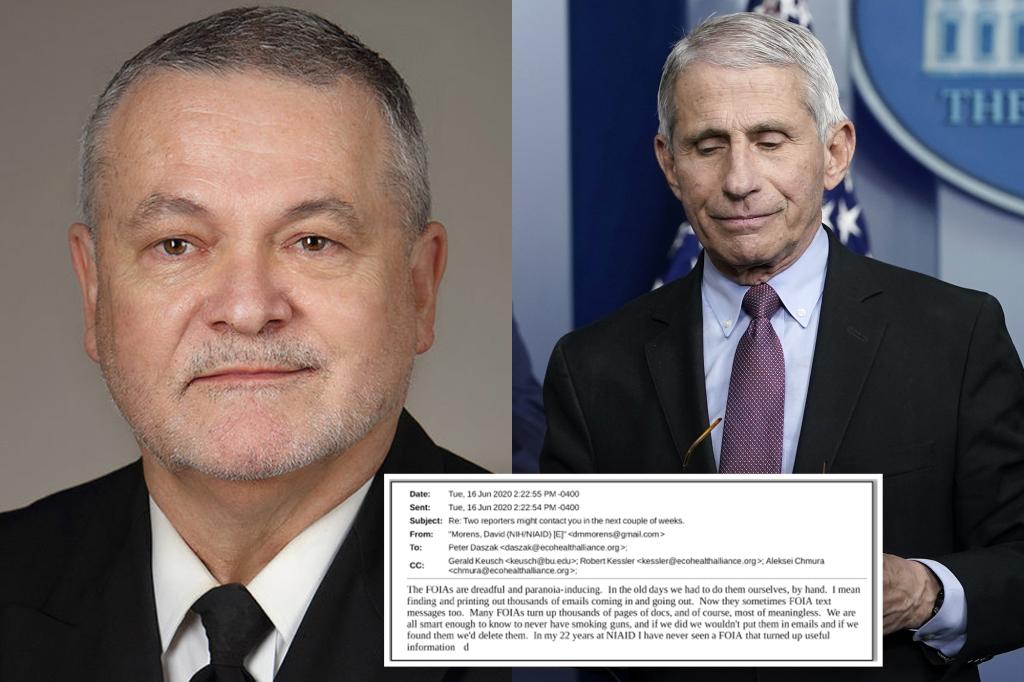The National Institutes of Health (NIH) faced scrutiny after a top adviser, Dr. David Morens, was found to have deleted records critical to uncovering the origins of COVID-19. Morens used a private email account to conduct official government business and solicited help from the NIH’s Freedom of Information Act (FOIA) office to avoid transparency. He even mentioned in emails how to make certain messages disappear before a search started, raising concerns about attempts to hide information related to COVID-19 origins. Morens also advised others not to send him information except to his private email account, potentially aiding secrecy in communications regarding the pandemic.
The House Select Subcommittee on the Coronavirus Pandemic uncovered emails suggesting that Dr. Anthony Fauci, Morens’ former boss at the National Institute of Allergy and Infectious Diseases (NIAID), might have been involved in a conspiracy to hide or destroy official records regarding COVID-19 origins. Emails from April 2021 reveal that Fauci preferred messages to be sent to his private email account to avoid causing any trouble. Morens also mentioned that Fauci might be privately concerned despite his public demeanor. This raises questions about the transparency and honesty of communication among top officials during the early stages of the COVID-19 pandemic.
Morens was accused of providing privileged information to EcoHealth Alliance, a federal grantee that funded gain-of-function research in Wuhan, China. The organization funded risky experiments on novel bat coronaviruses at the Wuhan Institute of Virology that potentially violated the terms of its NIH grant. Emails between Morens and EcoHealth Alliance President Dr. Peter Daszak showed how EcoHealth benefited from inside information about their NIH grant project. Although the experiments were briefly suspended during the pandemic, they were reinstated in 2023 after it was confirmed that gain-of-function research had indeed occurred.
Despite mounting evidence, NIH principal deputy director Lawrence Tabak denied that the gain-of-function research led to the creation of SARS-CoV-2. Former Centers for Disease Control and Prevention Director Dr. Robert Redfield and other officials have suggested that the most likely explanation for COVID-19 is that it escaped from a lab in Wuhan. However, Morens and Daszak dismissed these claims and promoted other theories about the origins of the virus. The emails also contained inappropriate conversations, such as misogynistic remarks and derogatory comments about political figures.
Morens will testify about the destruction of incriminating emails related to COVID-19, which could potentially be a violation of ethical standards and criminal law. The House Select Subcommittee on the Coronavirus Pandemic concluded that Morens likely provided false testimony about his involvement in handling critical information. Diane Cutler, a former investigator for the US Department of Health and Human Services, suggested that Morens’ actions might constitute flagrant and intentional misconduct. The NIH has yet to address the allegations raised by the subcommittee about the lack of transparency and honesty surrounding the handling of information about the COVID-19 pandemic.
Overall, the revelations about Dr. David Morens and Dr. Anthony Fauci raise concerns about the handling of information related to the origins of COVID-19. The attempts to avoid transparency and delete critical records indicate a lack of accountability and potential misconduct among top NIH officials. The involvement of EcoHealth Alliance in gain-of-function research at the Wuhan Institute of Virology, along with the dismissal of theories about the virus’ origins, point to a complex web of information that requires further investigation. The testimony and potential consequences for Morens could shed light on the extent of deception and manipulation involved in handling sensitive information about the pandemic.


